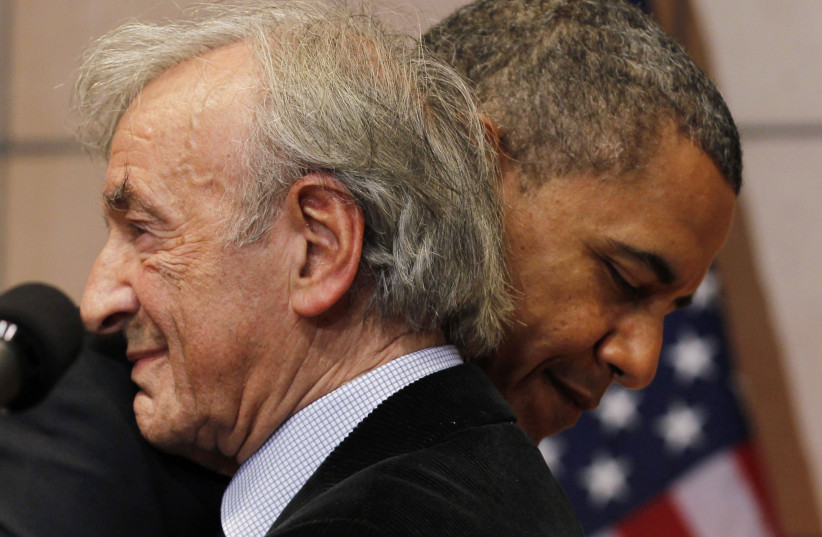I never met Elie Wiesel. I only have read two books that he wrote. He honored me by inscribing his novel The Oath and congratulating me on my bar mitzvah in 1977. My mother Devorah worked for the office staff for the Jewish Studies Department at City College in New York. Wiesel, a man of great intellect, empathy, and vision was a Distinguished Professor in the department overseen by Rabbi Irving “Yitz” Greenberg. Greenberg and Wiesel were teachers in an impressive faculty for whom my mother worked at the time of my rite of passage.
Wiesel could not make my bar mitzvah but he sent me his book as a gift. I still have not read it, more than four decades after I received it. But I have read his 1972 study of hassidic masters and their stories – Souls on Fire – many times. In my 26 years of lecturing to adults, I have quoted often from this book, one of my favorites in my well-stocked library of Jewish books.
His Sages and Dreamers: Biblical, Talmudic and Hasidic Portraits and Legends (1991) is also a wonderful study, based on his 25 years of popular and spellbinding lectures at the 92nd Street Y in Manhattan. This Shabbat I will read his groundbreaking The Jews of Silence, a work that inspired Rabbi Jonathan Porath, later an American oleh (immigrant) to Jerusalem, to become a key player in the movement to liberate Soviet Jewry from Communist dictatorship in the mid-1960s. Rabbi Porath – I discussed in these pages his recent memoir Here We Are All Jews: 175 Russian-Jewish Journeys – urged me to write this essay.
Wiesel's incomparable impact
Elie Wiesel: Holocaust survivor, scholar, author, teacher, and Nobel Peace Prize winner. He was a fighter for human rights throughout the world. He warned against indifference to human suffering. Wiesel was a man and Jew of great vision, clarity, and conscience. He represented Jews, as a witness, who survived the Shoah. Wiesel awoke the world to the plight of Soviet Jewry in The Jews of Silence (1966), just as Jonathan Porath started his journeys to the Soviet Union to connect with identifying Jews there.
Porath’s 2022 memoir describes the collaboration between the rabbi and the visionary. “Reb Eliezer” was Rabbi Porath’s mentor and friend. Since Wiesel’s death at age 87 in 2016, Porath has been concerned that his legacy is fading and there has not been a man of vision in the Jewish community and the world to take his place. Without a moral compass and a voice of conscience, this violent world is in trouble.
As a Nobel Laureate, Wiesel addressed the reason why the Norwegian Nobel Committee called him “a messenger to mankind.” He said, “Whenever and wherever human beings endure suffering and humiliation, take sides. Neutrality helps the oppressor, never the victim. Silence encourages the tormentor, never the tormented. Wiesel was not innocent. He knew the world did not learn the lessons of the Holocaust. He advocated for human rights everywhere: in apartheid South Africa, in the Rwandan Genocide, and the ethnic cleansing in Bosnia.

Israel-Diaspora relations
The one time in Israel when he criticized Israel’s treatment of the Palestinian and Israeli Arabs he did not get a good reception. He never delved into criticism of Israel again. In fact, his standing in the Diaspora is greater than that in Israel. He loved Israel and recognized the necessity of a Jewish State and army but he could never forget the way survivors in early Israel were unfairly criticized for not fighting back (although many did and survival from day to day was defiance).
I urge you to read veteran journalist Joseph Berger’s recent biography, Elie Wiesel: Confronting the Silence, an illuminating and readable study. The biographer quotes Wiesel in an essay that he wrote after journeying to Poland: “Jews were murdered because they were Jews, not because they were Poles. They, and they alone, were fated to total extermination not because of what they had said or done or possessed, but because of what they were.” This resonates in the aftermath of Hamas’s brutal assault on Israelis on October 7, 2023.
I wonder what would have been Wiesel’s response to the bloodiest day for Jews since the Holocaust. Perhaps he would not have been surprised by the ferocity of the attack on Jews and the indifference of the world and the emergence of hatred of Jews worldwide. But now is precisely the time his work and life should be remembered. We must carry on his mission of bearing witness.
With human rights abuses on a massive scale throughout the world – from China to Africa to Iran – Wiesel’s message of taking a stand against human suffering resonates for us. We need “a messenger to mankind.” The world cannot afford to forget Elie Wiesel. Let his words and his mission continue to be a presence in this violent world. I am hoping that Rabbi Porath’s concern concerning Elie Wiesel’s legacy not be confirmed by an indifferent humanity.
The writer is a rabbi, essayist, and lecturer in West Palm Beach, Florida.
